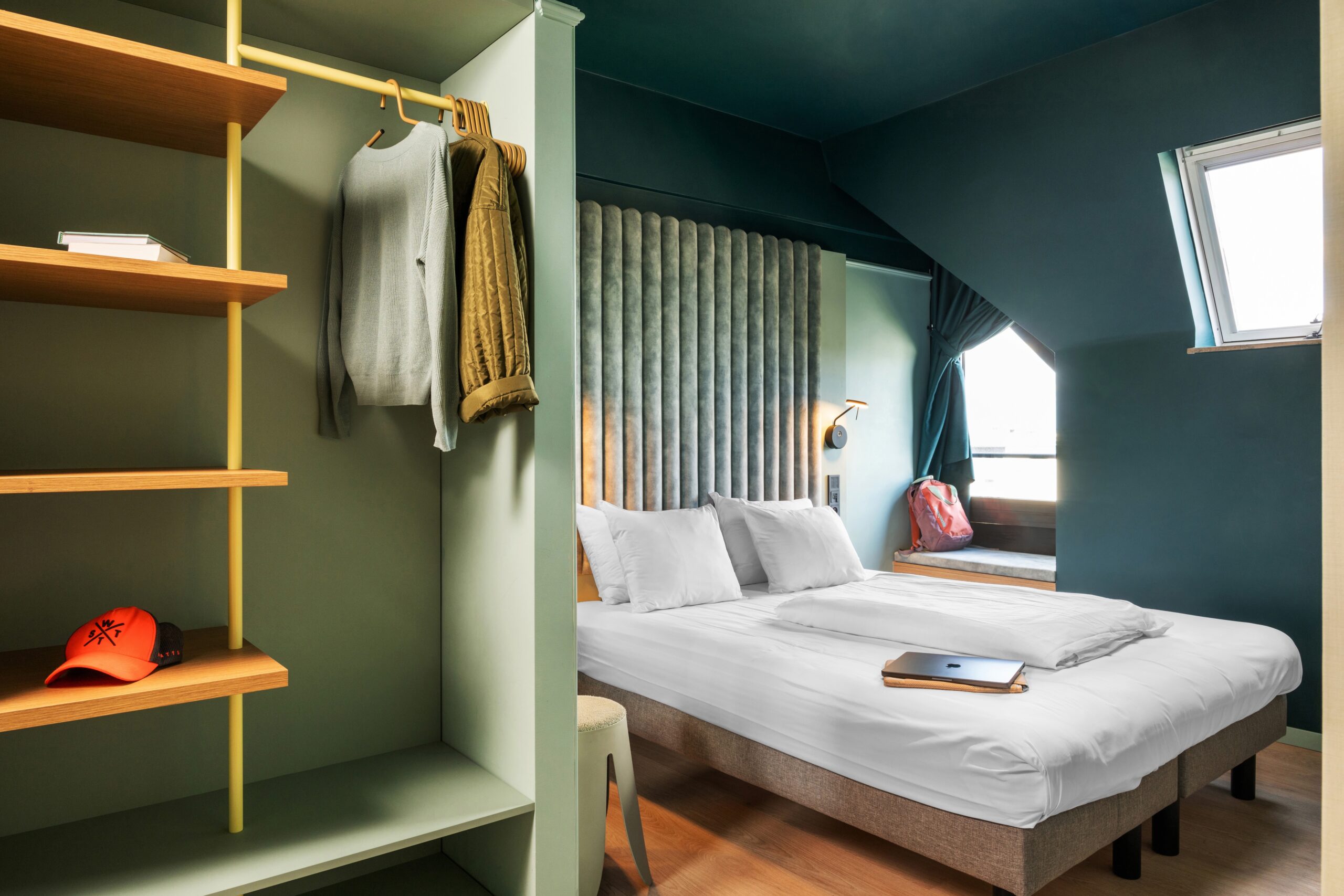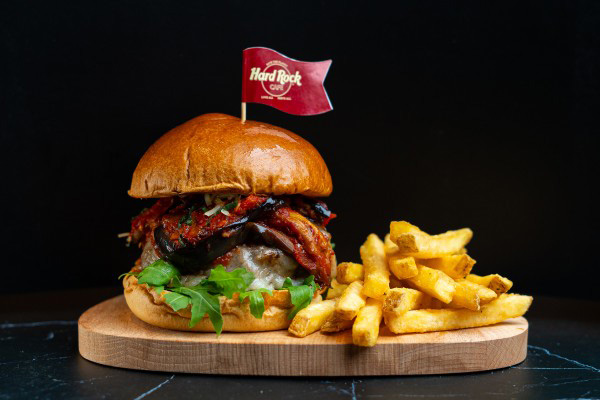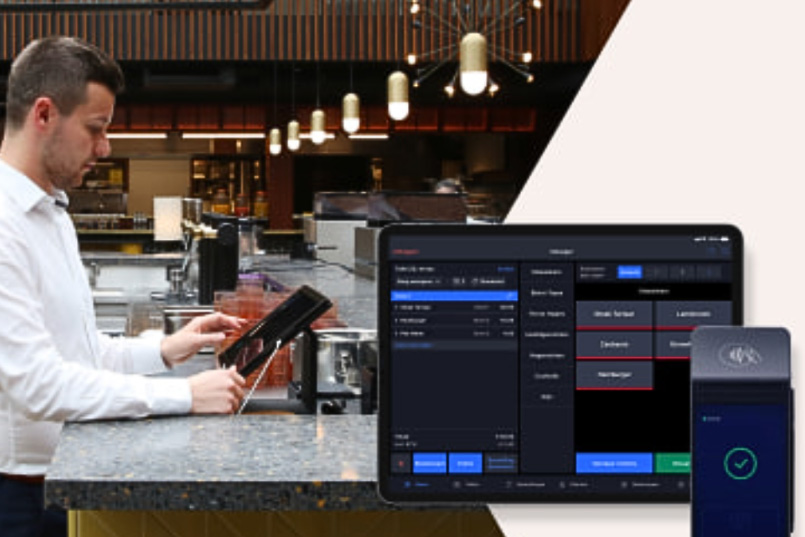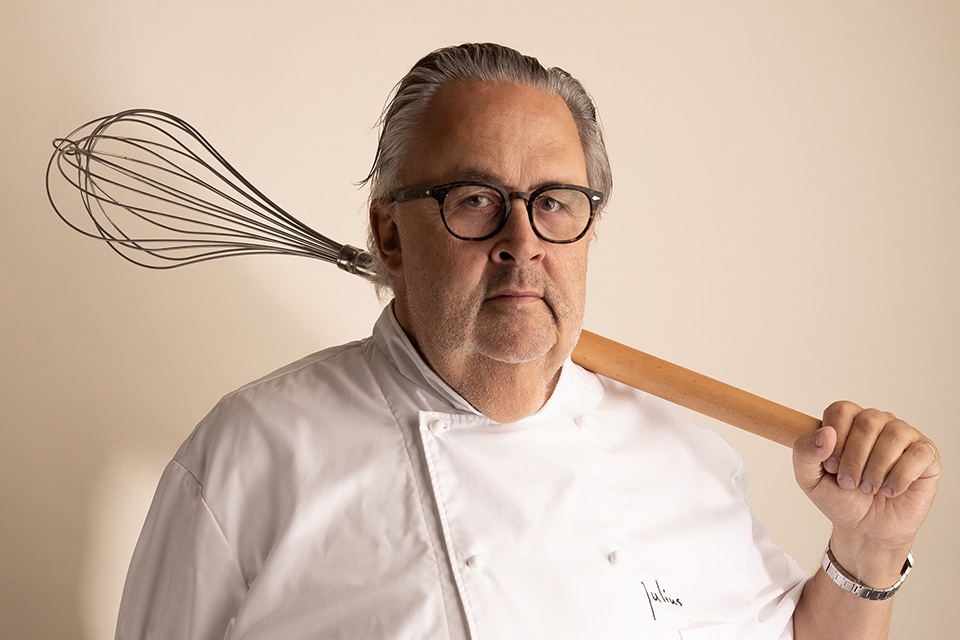
Julius Jaspers: 'If you want to excel, happiness doesn't exist'
Renowned Dutch chef, TV presenter and culinary writer Julius Jaspers, has made his mark on the culinary world with his creative dishes and passion for cooking. Hotelvak spoke to him about his career, his culinary philosophy and his vision for hotel restaurants.
Jaspers' love of cooking arose at an early age. "My mother was a culinary journalist and my father had a photography studio where culinary productions were made. Both were real foodies," Jaspers says. This laid the foundation for his career. "My sister often ate a meatball at friends' houses, while at home I ate hareback five days in a row to try a recipe of my mother. I enjoyed commenting on this."
After high school, Jaspers began his culinary journey without formal training, with catering activities and even a restaurant on a campsite in France for a few months. "Back in the Netherlands, I said, 'Now I'm an entrepreneur, mum!' From the parental home, I set up my own catering business. "I actually had no idea, but I did it and it worked. If a customer asked for stuffed veal breast, I would dive into my mother's cookbooks to find a recipe."
As the name recognition of 'Julius Traiteurs' grew, Jaspers was allowed to cater for a film. Opening two caterer shops gave him a steady income stream. "Later, more shops came my way when I was able to take over my mother's cookware shop along with my sister," he says. This grew to six Studio Bazar shops, which I was involved with for 20 years." A career in retail and wholesale trade was followed by three more restaurants, Julius Bar & Grill and two branches of Asian street food restaurant Happyhappyjoyjoy.
Classic kitchen comes back
Jaspers' culinary style is a mix of classic and modern influences. He describes himself as someone who loves "fresh acids" and has no sweet tooth. "My basic ingredients are always butter, lemon and onion. I use them in nine out of 10 dishes," he explains. Besides his love for classic French cuisine, he is also interested in Chinese cuisine. "In this, a lot of sugar is used, but in a sweet and sour way that suits me."
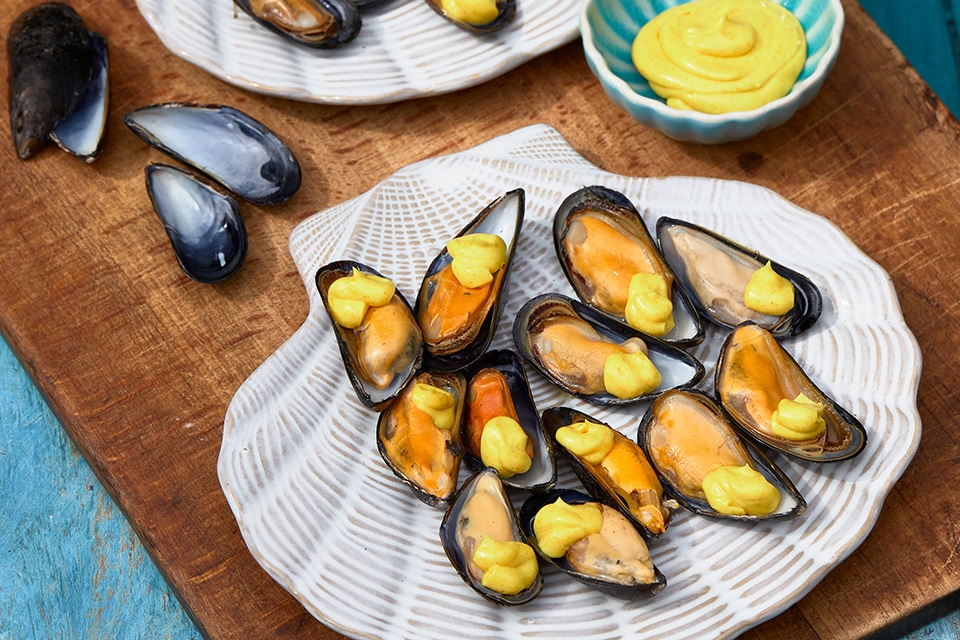
In his career, Jaspers has witnessed numerous changes in the culinary industry. "There has been a shift towards lighter and fresher dishes, with less butter and cream, more vegetables and less meat," he says. This trend aligns with his own philosophy of sustainability and minimising food waste. "I always try to use ingredients as fully as possible and throw away as little as possible. At the same time, I see classic cuisine coming back into restaurants, with old-fashioned côte de boeuf being prepared in butter again." The changes in the culinary world are reflected in Julius Jaspers' many cookbooks. His first book was created in 2005. "In Smart Cooking 1, I collected all the recipes from my catering and caterer days and for this I won the 'golden guard' award. When I was asked to be a judge for Topchef and Masterchef, even more doors opened for me." Partly because of this, Jaspers got the chance to open his restaurants and write more books.
"Working in a hotel restaurant differs from an independent restaurant in many ways," Jaspers says. "I have co-cooked in several hotels and regularly saw half-products coming in here, which are then built up. Nowadays, I see many smaller kitchens, with some of the production being housed elsewhere in dark kitchens. This benefits many restaurants at a time when good staff is scarce. I know good chefs who now only provide the finishing touches."
Convenience out the door
According to Jaspers, hotel restaurants face the challenge of differentiating themselves and engaging guests. "You want to trigger something with your guests so that they come back. To achieve that, it is important to be honest about your strengths and weaknesses. You cannot be lazy, because it is not a given that guests will come to eat with you. I often don't take breakfast in a hotel because my experience is old croissants and packets of jam that you have to pull open. You have to do something for it!"
To attract outside guests as well, Jaspers says hotels need to work on the image people have of them. "You don't want to be a bed and breakfast where you can also eat, but a real and fine restaurant," he says. He advises hotels to do good research on their culinary offerings and to see what is already in the area. "You have to be distinctive, but also look at the financial side. The spending pattern of guests on an industrial estate in Nijkerk is different from guests in central Amsterdam. After all, the team you work with also has an influence; you shouldn't focus on fine dining with Chips, but the same applies the other way round." So setting up a good restaurant is a complex issue. "If someone had THE recipe, it would be very easy!"
Anno 2024 Jaspers has sold his Studio Bazar shops and returned to catering. He also writes an average of two cookbooks a year. By now, 26 of his books have been published. "I am now finalising my 'Christmas Bible', which will be published in October. I am also preparing the 'Barbecue Bible 2.0', a sequel to the first version that became a bestseller. The new book will feature more vegetables and fish, but of course also beautiful cuts of meat."
By continuing to teach cooking classes, Jaspers stays engaged with the younger generation. "I always advise them to follow their hearts, but if you want to excel, luck doesn't exist. You have to put in a lot of hours to become good at something and therefore work hard. The most successful young chefs are the ones who get there first, leave last and don't drink too much." At the same time, he acknowledges that the work mentality among chefs has changed. "Often they think working four days a week is enough. If they are that happy, that is fine, but I have never been like that. My culinary journey has been an adventure; I will continue to be an entrepreneur all my life."
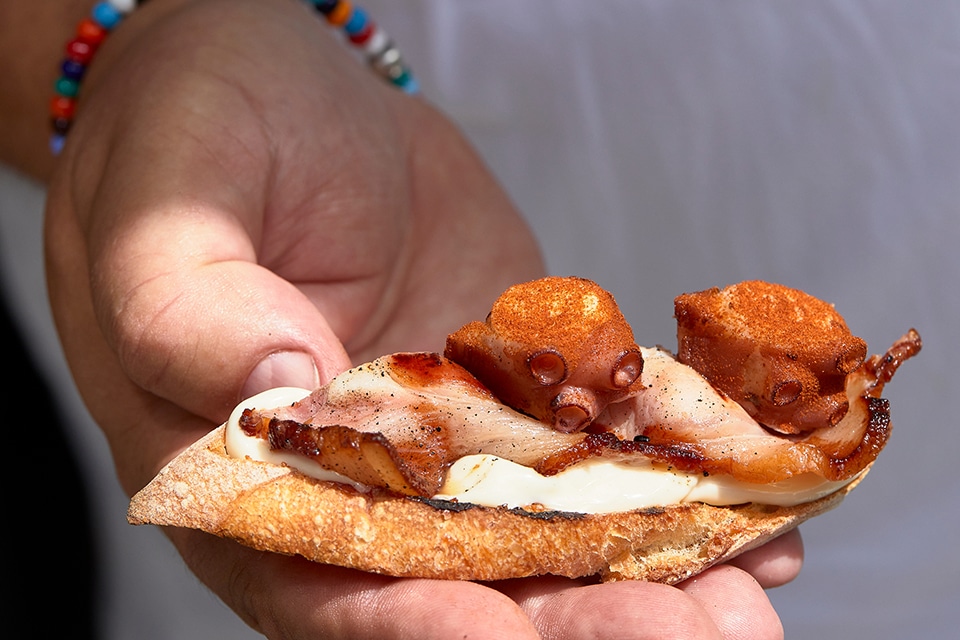
Recipe: Pan-aioli bacon octopus
- 1 octopus (or at least 4 octopus tentacles)
- 12 3×7 cm slices of breakfast bacon (Slightly thicker cut)
- 1 baguette, in 12 slices
- aioli
- pimentòn
- pecorino cheese, optional
1. Place the octopus in the freezer* at least a day in advance, then refrigerate for a day to defrost.
2. Bring water with onion to the boil and dip the octopus in the water for 3 x 15 seconds before finally putting it in.
3. Cook the octopus for 45 minutes until tender, remove from the water, allow to cool and slice at right angles lengthwise.
4. Fire up the bbq to 220ºC and place a platesetter (a steel or ceramic plate between the fire and your grill) with a drip tray.
5. Grill the strips of bacon crispy all around, followed by the sliced octopus.
6. Grill the baguette pieces crispy all around, spread with aioli, top with bacon and place 3 pieces of octopus on each piece of bread. Sprinkle with pimentòn and serve immediately.
* You can skip that freezing and thawing, but you'll be pounding on the octopus for an hour to get it tender.
No appetite for octopus? Leave it be!!!
Follow all the steps and, using a fine Microplane, grate a cloud of Pecorino over the bread, super delicious with bacon and aioli.
